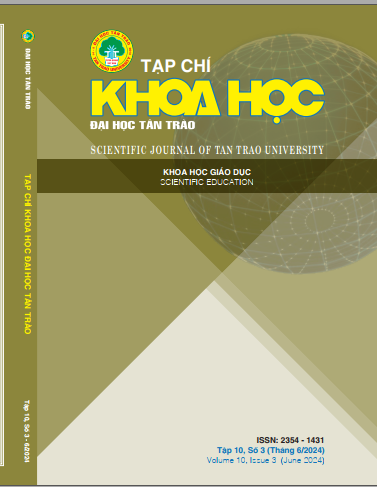A STUDY ON SPEAKING ANXIETY OF SENIOR STUDENTS IN THE PROCESS OF ENGLISH LANGUAGE LEARNING AT HANOI METROPOLITAN UNIVERSITY, VIETNAM
DOI:
https://doi.org/10.51453/2354-1431/2024/1210Keywords:
anxiety, learners, speaking skills, speaking anxiety, challengesAbstract
Speaking anxiety in English language learning remains a significant barrier to academic achievement and professional development, particularly among non-native speakers in higher education. This study investigates the psychological factors affecting English-speaking competence among senior English majors at Hanoi Metropolitan University during the 2023-2024 academic year. The research aims to identify the primary sources of speaking anxiety and develop effective interventions to enhance students' oral proficiency and self-confidence. The study employed a mixed-methods approach, combining quantitative surveys using the Foreign Language Classroom Anxiety Scale (FLCAS) with qualitative semi-structured interviews. A sample of 150 senior English majors participated in the survey, with 20 students selected for in-depth interviews to explore their experiences with speaking anxiety. Findings revealed that fear of negative evaluation, limited vocabulary, and insufficient speaking practice were the predominant factors contributing to anxiety. Additionally, cultural aspects, such as face-saving concerns and perfectionist tendencies, significantly impacted students' willingness to communicate. The study demonstrated that implementing targeted interventions, including small-group discussions, regular speaking practice sessions, and anxiety management workshops, led to measurable improvements in students' speaking confidence and performance. These findings provide valuable insights for educators to develop more effective teaching strategies and support systems that address the psychological barriers in English language acquisition.
Downloads
References
Allen, Bourhis (1995). The Relationship of Communication Apprehension to Communication Behavior: A Meta-Analysis. Top Three Paper in Communication Theory Western States Communication Association Convention
Asti Gumartifa1, Indawan Syahri2 (2021). English Speaking Anxiety in Language Learning Classroom. English Language in Focus (ELIF), 3(2), 99–108.
Carleton, R. N., McCreary, D. R., Norton, P. J., & Asmundson, G. J. G. (2006). Brief Fear of Negative Evaluation Scale-Revised. Depression and Anxiety, Hillsdale, NJ: Erlbaum. 23(5), pp. 297–303.
Darmaida Sari (2017). SPEAKING ANXIETY AS A FACTOR IN STUDYING EFL. ENGLISH EDUCATION JOURNAL (EEJ), 8(2), pp.177-186.
Demir, H. (2015). Speaking anxiety among Turkish EFL students (Case of IBSU). Journal of Education – Volume 4, Issue 2, pp. 37-43.
Dusek, J. B. (1980). The development of test anxiety in children. In I. G. Sarason (Ed.), Test anxiety: theory, research and applications. Hillsdale, NJ: Erlbaum
Horwitz, E.K., Horwitz, M.B., & Cope, J. (1986). Foreign language classroom anxiety. The Modern Language Journal, 70(2), pp.125-132.
Horwitz, E., Tallon, M., & Luo, H. (2010), Foreign Language Anxiety. In J. C. Cassady (Ed.), Anxiety in schools: The Cause, Consequences and Solutions for Academic Anxieties (pp. 95-99). New York: Peter Lang Publishing.
Habiburrahim, H., Risdaneva, R., Putri, G., Dahliana, S., & Muluk, S. (2020). The Effects of Anxiety Toward Acehnese Students' English Speaking Ability. The Qualitative Report, 25(1), pp.254-270
Belgin AYDIN (1999), A STUDY OF SOURCES OF FOREIGN LANGUAGE CLASSROOM ANXIETY IN SPEAKING AND WRITING CLASSES. Anadolu University The Institute of Social Sciences
Ho Dinh Phuong Khanh, Truong Thi Nhu Ngoc (2022). EXPLORING VIETNAMESE NON-ENGLISH-MAJOREDFRESHMEN'S ENGLISH-SPEAKING ANXIETY AT A PUBLIC UNIVERSITY IN VIETNAM. VNU JOURNAL OF FOREIGN STUDIES, VOL. 38, NO. 5 (2022)
Kevin Manley (2015), Comparative study of Foreign Language Anxiety in Korean and Chinese Students. Thesis at St. Cloud State University
Koichi Sato (2003), Improving Our Students' Speaking Skills: Using Selective Error Correction and Group Work to Reduce Anxiety and Encourage Real Communication. Akita Prefectural Akita Senior High School
Le Thi Phuong Chi (2021). ĐẶC ĐIỂM TÂM LÍ LO LẮNG CỦA SINH VIÊN TRONG LỚP HỌC KĨ NĂNG NÓI TIẾNG ANH. Journal of University of Foreign Languages, Hue University.
Mawardin M.Said, Sukardi Weda (2018). English Language Anxiety and its Impacts on Students’ Oral Communication among Indonesian Students: A Case Study at Tadulako Universityand Universitas Negeri Makassar. TESOL International Journal Vol. 13 Issue 3.
Öztürk, G., & Gürbüz, N. (2013). The impact of gender on foreign language speaking anxiety and motivation. Procedia –Social and Behavioral Sciences. 70, pp. 654-665.
PETER D. MACINTYRE, R. C. GARDNER (1991), Investigating Language Class Anxiety Using the Focused Essay Technique. New York.
Rumiyati, Seftika (2018). Anxiety of Speaking English in English Foreign Language (EFL) Class. Journal of English Education, Literature and Linguistics, Vol. 1 No.1
S.Rachman (2013). Anxiety, Clinical Psychology. Third Edition.Hillsdale, NJ: Erlbaum.
Tran Thi Trang Loan (2022). An Investigation into the Causes of Students' Anxiety in Learning English Speaking Skills. International Journal of TESOL & Education Vol. 2; No. 3; 2022
Downloads
Published
How to Cite
Issue
Section
License

This work is licensed under a Creative Commons Attribution-ShareAlike 4.0 International License.
All articles published in SJTTU are licensed under a Creative Commons Attribution-ShareAlike 4.0 International (CC BY-SA) license. This means anyone is free to copy, transform, or redistribute articles for any lawful purpose in any medium, provided they give appropriate attribution to the original author(s) and SJTTU, link to the license, indicate if changes were made, and redistribute any derivative work under the same license.
Copyright on articles is retained by the respective author(s), without restrictions. A non-exclusive license is granted to SJTTU to publish the article and identify itself as its original publisher, along with the commercial right to include the article in a hardcopy issue for sale to libraries and individuals.
Although the conditions of the CC BY-SA license don't apply to authors (as the copyright holder of your article, you have no restrictions on your rights), by submitting to SJTTU, authors recognize the rights of readers, and must grant any third party the right to use their article to the extent provided by the license.





